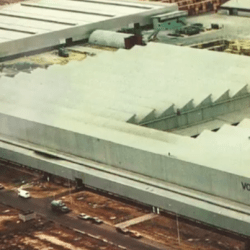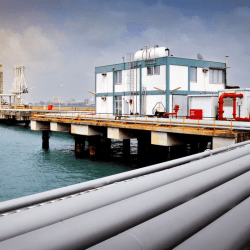In Nigeria’s quest for reliable and sustainable power, the Azura-Edo Independent Power Plant (IPP) stands as a transformative achievement. As a privately funded power project, the Azura-Edo IPP not only addresses critical electricity shortages but also aligns with Nigeria’s broader energy reform initiatives. The plant is a powerful example of how private investment and advanced technology can come together to meet the energy needs of millions while setting a standard for future projects. Julius Berger, a key partner in the project, played a substantial role in delivering critical infrastructure and logistical support, reinforcing its reputation as a cornerstone of Nigerian industrial advancement.
A New Era in Nigerian Power Generation
Nigeria’s power sector has faced numerous challenges over the years, from chronic underinvestment to inadequate infrastructure. These issues have historically resulted in inconsistent electricity supply, which has impacted economic growth and development. In response, the Nigerian government has pursued reforms aimed at increasing energy capacity, reliability, and sustainability.
The Azura-Edo IPP, launched in 2018, exemplifies a pioneering shift toward privately funded, independent power generation projects. It serves as a template for energy reform by reducing the burden on public funding and promoting operational efficiency and transparency. As one of Nigeria’s largest privately funded power projects, the plant generates 461 MW, contributing a substantial portion to the country’s energy grid and benefiting both urban and rural communities.

Julius Berger’s Integral Role
Julius Berger, a major player in Nigeria’s construction and infrastructure sector, was essential in realizing the Azura-Edo IPP vision. The company’s responsibilities spanned civil and building works, the management of temporary facilities, and comprehensive logistical support throughout the project. Julius Berger’s infrastructure expertise ensured that the power plant was completed on schedule and met international standards.
Scope of Julius Berger’s Contribution
- Civil and Building Works: Julius Berger undertook extensive structural development, constructing facilities essential for plant operations, including turbine halls, control rooms, and administrative offices. The company’s commitment to high-quality building standards helped establish a reliable foundation for the plant’s ongoing operations.
- Operation of Temporary Facilities: To maintain smooth project execution, Julius Berger set up and managed temporary facilities for workers and equipment. These facilities provided safe working conditions, efficient workflows, and the logistical support required for a project of this magnitude.
- Logistical Support: Effective logistics were crucial for the timely delivery of materials, equipment, and personnel to the site. Julius Berger’s logistical framework ensured that project phases proceeded without delay, optimizing resources and minimizing costs.
Technology and Capacity of the Azura-Edo IPP
The Azura-Edo IPP is equipped with state-of-the-art gas turbines that convert natural gas into electricity with remarkable efficiency. This advanced technology enables the plant to produce 461 MW of power, meeting the needs of over 14 million people across Nigeria. The gas-fired turbine system not only ensures high output but also adheres to stringent environmental standards, making it a relatively clean energy source within Nigeria’s fossil fuel-dependent grid.
Grid Integration and Distribution
The electricity generated by Azura-Edo IPP integrates seamlessly into Nigeria’s national grid, making it accessible to communities throughout the country. The plant’s location in Edo State is strategic, allowing it to supply power to key distribution networks and helping reduce the frequency of blackouts. The ability to distribute such a significant amount of energy across the grid enhances power supply stability, providing industries, businesses, and households with more reliable access to electricity.
Economic and Social Impact
Beyond power generation, the Azura-Edo IPP project has had a substantial impact on the local economy. By creating job opportunities and fostering skill development, the project has contributed positively to the surrounding communities.
- Job Creation and Skill Development: During the construction phase, the project provided employment for thousands of Nigerian workers, with a significant focus on skill development in areas such as engineering, project management, and operational maintenance. This skill transfer empowers local talent and enriches Nigeria’s labor market with individuals equipped to work on similar projects in the future.
- Boost to the Local Economy: The Azura-Edo IPP has stimulated economic activity in the Edo region, benefiting local businesses involved in supplying materials and services to the plant. Increased electricity access also supports small businesses and entrepreneurs, promoting economic growth and stability in nearby areas.
A Blueprint for Privately Funded Power Projects
The Azura-Edo IPP is regarded as a model for future private-sector-driven energy projects in Nigeria. Its success has shown that private investment can effectively drive power infrastructure development, fostering competition and efficiency. The financial model employed by Azura Power West Africa, the developer of the Azura-Edo IPP, combined international and local investments, setting a precedent for similar projects.
Financial Model and International Partnerships
Funding for the Azura-Edo IPP was secured through a combination of equity, debt, and credit support from local and international sources, including the World Bank. This financing structure has demonstrated the potential of Nigeria’s energy sector to attract investment, strengthening confidence in the country’s commitment to reform and modernize its infrastructure.
Supporting Nigeria’s Energy Reform Goals
The Azura-Edo IPP aligns closely with Nigeria’s Power Sector Recovery Program (PSRP), which aims to increase access to electricity, reduce inefficiencies, and ensure financial viability in the energy sector. The project also directly supports the Nigerian Energy Reform Act of 2005, which seeks to enhance the reliability and sustainability of the country’s power supply.
The plant’s output contributes to Nigeria’s energy generation targets, addressing gaps in electricity access and supporting economic growth by providing a stable power supply to more regions. The project’s success has also paved the way for similar projects to be launched, helping Nigeria to reach its goal of sustainable energy independence.
Environmental Impact and Sustainability Efforts
The Azura-Edo IPP project is mindful of its environmental footprint, incorporating sustainability measures to minimize its impact. The plant’s gas turbine technology produces lower emissions compared to traditional coal-fired plants, contributing to cleaner energy production within Nigeria’s energy grid. By prioritizing natural gas, a cleaner-burning fossil fuel, the Azura-Edo IPP is a more sustainable option that aligns with Nigeria’s climate commitments.











